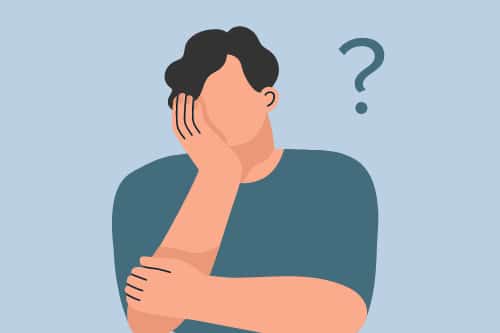What is an Existential Crisis? And How to Cope with it?
Ishita Sharma
July 17, 2022
Ishita Sharma
July 17, 2022
At some point in time, we all face questions like, what is the true meaning of life, what is my life’s purpose, or who am I? Life is a mystery and thinking about life’s deep questions is very natural. However, when these thoughts become all-consuming, you feel overwhelmed with despair, anxiety, and frustration. This is what is known as an existential crisis.
An existential crisis occurs when a person begins to question his or her very own existence. It can be described as persistent negative feelings and emotions that a person experiences while searching for the inherent meaning of life. In some cases, extreme thoughts and unanswerable questions leave one feeling frustrated, anxious, depressed, and even suicidal.
Existential dread or existential anxieties are other names for the same. Many people go through a phase of existential crisis. An existential crisis may result from intense feelings of despair as you consider questions like, “What is the point?” or “Why does any of this matter?”
It normally coincides with a turning point in life. Therefore, any significant incident that breaks the existing and safe pattern of thinking or living and throws one from the known to the unknown can be considered as a trigger. It can also be borne out of a sudden external disruption like a pandemic or a natural calamity that breaks the safety net or a pattern that so far was regarded as normal life.
It is normal to think deeply about your life or question your feelings. The issue comes in when no answer satisfies you. It becomes a constant loop of complex questions with no fulfilling solution. This, in turn, leads to a conflict within yourself about your reason for existence. Anyone of any age can go through an existential crisis.
Many of these symptoms may seem similar to those of other mental illnesses. To identify an existential crisis, look for trigger points. Generally, the difficulty of everyday life or hardships at work or family does not boil down to this. Major life-changing incidents act as a trigger for an existential crisis to occur. Any situation that disrupts your daily routine is a seed for the crisis to grow.

Sometimes the loss of a loved one can also trigger an existential crisis as one begins to question the meaning of life and the finality of death.
An existential crisis related to death means you are focused on the possibility of dying and what happens after that. This existential anxiety may occur with age or with the diagnosis of a chronic illness.
Sometimes the end of a personal relationship, which signals the end of a unit and the lack of an individualistic identity, often develops a feeling of low self-worth. It makes the person question life, leads to anxiety and loneliness.
The entire world is going through a pandemic. People have lost their jobs, loved ones, family members, parents, livelihood and everything to this pandemic. Isolation and not being able to connect with people have led to a sense of loneliness.
We are surrounded by grief, suffering, and death, which have led to a feeling of helplessness, anxiety, and frustration. It makes one question the uncertainty and meaninglessness of life.
We all love our freedom. However, too much freedom can also cause uncertainty, depression, and even anxiety. The freedom to do anything can lead to an existential crisis.
Some people suppress their emotions, and at some point, these feelings may bounce back with intensity, leading them to feel these emotions dramatically. This can leave a person feeling overwhelmed and they may begin a downward spiral if their emotional crisis is not resolved.
There is no right way to live life. What you make of life is your responsibility. This kind of thought process can instil a fear of failure. The fact that no one else can come to your rescue and you are alone in this journey called ‘life’ can alienate one from others.
When you know that you are about to make a significant decision, which can alter the course of your life, it can work as a trigger and can lead to existential anxiety.
Ideally, people cherish important life events. However, some people may feel crippled by them. Turning 50, kids leaving home, living alone, etc. are examples that can leave you questioning life. Change is difficult and the transitioning phase can be nerve-wracking. Some major life events bring about existential dread.
You begin to question the fundamentals and your very identity. Look back on life and feel that you have not expressed yourself. You have trodden the safe path or you have not voiced your displeasure. You may have shoved your grief under the carpet. In the process, you have denied yourself.
An existential crisis occurs when a person feels a sense of meaninglessness in life, a lack of motivation, and a sense of constant despair. People often struggle with mental health issues like anxiety and depression during a period of existential crisis.
However, anxiety and depression caused by the existential crisis are very different from clinical depression and anxiety. Existential anxiety is caused by the fear of life’s true meaning or the lack of meaning. An individual could feel anxious about their life choices or the lack of freedom to make a choice.
Existential depression refers to the feelings of disinterest, sadness, hopelessness, and loss of motivation that often accompany an existential crisis. An individual may feel hopeless about the society, world, and life in general. They feel there is no point in doing anything because nothing will make a difference to anyone. This leads to a lack of motivation and affects the mental health of the person.
Existential crisis makes an individual feel unwanted and as a result, they isolate themselves from others. During this crisis, loved ones and friends should support such people and make them feel loved. They should be reminded how important they are to the world. Constant support and love can help people deal with existential depression, anxiety, and other mental health issues.


Follow the practice of writing or filling a journal every day with every little thing that makes you grateful.
Simple things like being grateful for the food on your plate or the clean air that you breathe can also be helpful. At times when you question life’s meaning, read the journal. It will remind you of all the things you are blessed with.

Going through an existential crisis phase will cloud your mind with negative thoughts. It is often difficult to break the loop of negativity. Hence, train your mind to look for positives among all the negatives.
Simple tools like meditation, creating positive affirmations, and going for a strenuous workout could help one get out of negative space.

It is pointless to fret about things that are not under your control. Understand and make peace with the fact that you cannot find answers to everything.
Therefore, being mindful and simply being in the present can help you cope better. A simple exercise of bringing back your focus to the present moment, studying the surrounding, focusing on breathing, and telling yourself that life is beautiful, can be a life-changing hack.

Most questions that arise during an existential crisis are complex and difficult to answer. Break big questions into smaller ones. This can help one to simplify life. Therefore, take one baby step at a time and stop the noise in your mind.

You clutter your mind with constant contemplation. Saying it aloud will help you identify the real issues. Talk it out with a friend or a family member. Hearing a perspective that is different from yours may change the way you look at things.

Do not dwell on any uncomfortable or traumatic experience. Put your energy into things that you are passionate about. Take up hobbies or help for a cause to find fulfilment in life.
You can come out of an existential crisis by yourself. Visit a therapist to navigate through this better. If thoughts about your existence and life make you feel anxious or depressed or negatively affect you in other ways, it may be time to see a mental health professional.
When the symptoms are recurring or become worse, then you must visit a psychologist. They can help you through regular sessions of CBT (cognitive behavioural therapy). If an existential crisis leads to suicidal thoughts, ask for immediate help. Visit a good mental health expert to deal with anxiety and depression at the very onset.
Wondering about life and your purpose in this world is natural. Many people go through these existential thoughts at some point in their lives. Thinking about such questions does not lead to an existential crisis. However, the emotions that result from these questions and the feelings that arise can lead to situations where your entire existence becomes a question.
Take charge or take help, count your blessings, talk about your problems, and divert your energy into constructive activities. Look for enablers that can actively help you break free from an existential crisis. Sometimes forgiving others, not thinking about past mistakes, and simply letting go, are also tools that can help you deal with an existential crisis. Though it is self-treatable, you can also visit a therapist for faster recovery. Follow the tips given and seek help if required.
A. There is a separate branch of psychotherapy called existential therapy. It focuses mainly on dealing with an existential crisis. It helps you to increase self-awareness and focus on your responsibilities, your reality, and happiness. Existential therapists also teach you the fact that worries and anxiety are a part of life. They will help you positively cope with these.
A. You can start by being a safe space for them to open up. Do not invalidate their feelings or questions. Listen to them with an open heart and give your suggestions. Reassure them that it is okay to feel that way. Gently encourage them into seeking professional help if they happen to have suicidal thoughts.
A. Gifted children and teenagers are capable of going through an existential crisis. The ability to question life or purpose generally begins in adolescence. However, some children possess special skills and emotional traits. Such children can ponder upon life. There isn’t a defined age or gender when it comes to an existential crisis.
A. Both are not the same. However, a mid-life crisis can be a type of existential crisis. A mid-life crisis makes you question your achievements. It gives you a feeling of not having done enough. An existential crisis is a broad umbrella term. One type of existential crisis is due to significant alteration in life events. Hence, something inevitable, like reaching middle age, experiencing empty nest syndrome, or similar expected events in one’s life cycle, can attain massive proportions in the mind and trigger an existential crisis.
A. Repetitive thoughts about the meaning of life or your purpose in it can be an existential obsessive compulsion disorder. It is an obsession with such thoughts that do not leave your mind. It becomes impossible to calm down without finding the answers to your questions. Existential OCD consumes a big part of your day with the same loop of questions about existence.
